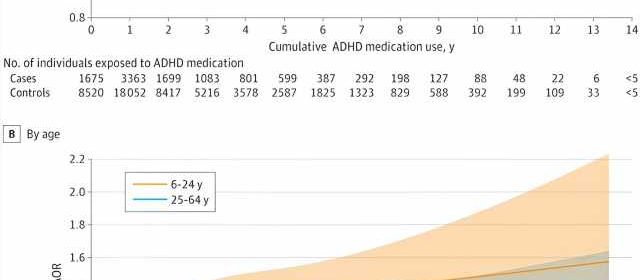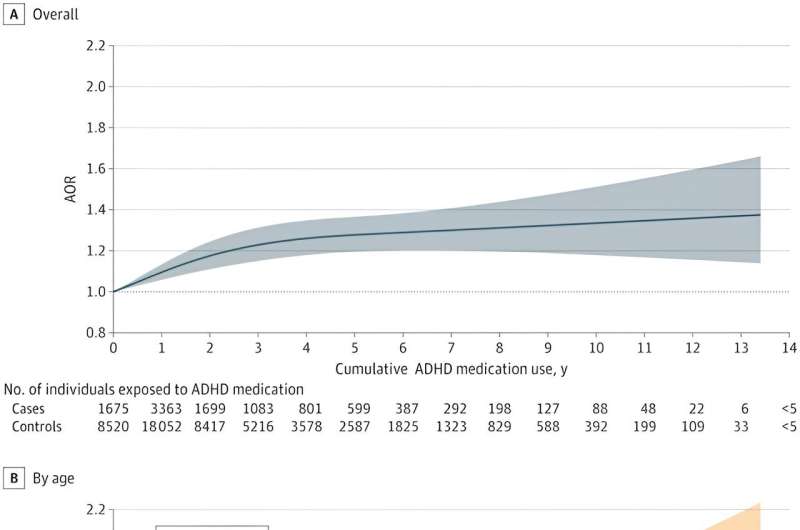New findings on long-term treatment of ADHD and link to cardiovascular disease


A large proportion of patients who start taking ADHD medication, especially young adults, stop within the first year. However, people who use ADHD medicine for a long time and in higher-than-average doses seem to have a higher risk of some cardiovascular diseases. This is according to two new studies led by researchers from Karolinska Institutet and published in The Lancet Psychiatry and JAMA Psychiatry.
More than half of all teenagers, young adults and adults who received ADHD medication had stopped taking it within the first year. The proportion of children, on whose behalf decisions are made by parents or guardians, was slightly lower, but nonetheless, 35% stopped their medication within a year. The multinational study led by researchers at Karolinska Institutet in Sweden was published in The Lancet Psychiatry.
Risk of falling between the cracks
The researchers analyzed prescription data from more than 1.2 million patients who started ADHD medication in Australia, Denmark, Hong Kong, Iceland, the Netherlands, Norway, the U.K., Sweden and the U.S. The pattern was the same in all countries/regions.
“It’s unlikely that so many people discontinue their treatment because their ADHD symptoms have remitted, meaning that the high rate of early discontinuation may be a major barrier to effective treatment,” says Zheng Chang, senior researcher at the Department of Medical Epidemiology and Biostatistics at Karolinska Institutet who led both studies. “We haven’t been able to analyze the direct causes in this study, but common reasons for discontinuing ADHD medication are adverse reactions and lack of effect.”
The highest rate of medication discontinuation occurred among 18- to 19-year-olds. This is when they leave child and adolescent psychiatry and enter adult psychiatry, a transition where they risk falling between the cracks. This is a shortcoming that the health care services must remedy, researchers say.
“We need to improve the transition to adult psychiatry and spread knowledge about the fact that problems associated with ADHD often persist over time,” says Isabell Brikell, research coordinator at the Department of Medical Epidemiology and Biostatistics, Karolinska Institutet, and one of the first authors of the study in The Lancet Psychiatry. “In addition, new digital tools such as simple SMS-based inventions could be used to help people with ADHD manage their medication.”
Denmark sticks out
A country that sticks out in the statistics is Denmark, which had a much lower proportion of children who discontinue their treatment within a year—18%, as opposed to the mean of 35%. Compared with other Nordic countries like Sweden and Norway, the prescription of ADHD drugs is lower, which could suggest that medication is only prescribed to those with severe ADHD and the greatest need, researchers say.
“Sweden has a relatively high prescription rate of ADHD medication compared with many other European countries, so it is possible that we over-prescribe here,” says Zheng Chang.
In another study conducted with more than 275,000 Swedish ADHD patients, now published in JAMA Psychiatry, Dr. Chang and his research group examined ADHD medication use for up to 14 years. They were then able to show that ADHD medication when taken for a longer time and in higher doses than average is associated with a higher risk of some cardiovascular diseases, primarily hypertension and arterial disease.
In general, the risk of cardiovascular disease increased by approximately 4% annually. The risk increase was greatest in the first few years of treatment and then leveled off, and it was only statistically significant at doses higher than 1.5 times the average daily dose (so-called defined daily dose, DDD). This means that those treated with lower doses are not likely to develop cardiovascular disease, according to the researchers.
Patients should be followed up
“There is a long list of drugs that have been linked to a comparable increased risk of hypertension when used long-term such as the one found here, so patients should not be alarmed by these findings,” says Le Zhang, postdoc researcher in Dr. Chang’s research group and first author of the JAMA Psychiatry study.
“However, in clinical practice, the raised risk should be carefully weighed against the recognized benefits of treatment on a case-by-case basis. Doctors should also regularly follow up the ADHD patients to find signs and symptoms of cardiovascular disease while they’re on medication over the long-term.”
Since this is an observational study, it is not possible to conclude that it is the ADHD medication that leads to an increased risk of cardiovascular disease. As the researchers point out, it could depend on other medications, symptom severity or lifestyle factors.
More information:
Isabell Brikell et al, ADHD medication discontinuation and persistence across the lifespan: a retrospective observational study using population-based databases, The Lancet Psychiatry (2023). DOI: 10.1016/S2215-0366(23)00332-2
Le Zhang et al, Attention-Deficit/Hyperactivity Disorder Medications and Long-Term Risk of Cardiovascular Diseases, JAMA Psychiatry (2023). DOI: 10.1001/jamapsychiatry.2023.4294
Journal information:
JAMA Psychiatry
,
The Lancet Psychiatry
Source: Read Full Article